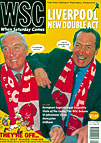 With their team expected to struggle in the Second Division, Oldham Athletic fans are preparing for a season of protest against the board, as Steve Ragg reports
With their team expected to struggle in the Second Division, Oldham Athletic fans are preparing for a season of protest against the board, as Steve Ragg reports
Easter Monday 1994: Oldham Athletic, occupying 16th place in the Premier League, go down 3-2 at Old Trafford, in a dress rehearsal for the following week’s FA Cup semi-final.
Easter Monday 1998: Angry Latics fans form a sit-in protest after the 1-0 home defeat by Wycombe Wanderers, a result which leaves them just four points above the Second Division relegation places and facing their third demotion in four years.
Relegation was eventually avoided, but as the season ended Neil Warnock become the second manager in 15 months to quit the club blaming lack of ambition for his departure. To many, the decline can be traced back to that last-minute Mark Hughes goal in the 1994 semi-final, but the real root of the problem stems from the top. The chairman Ian Stott and his board of directors cannot be held blameless, but the chief culprits are the club’s major shareholders, JW Lees Brewery.
In 1974 JW Lees bought a 48 per cent shareholding in the club. After years of offering no apparent financial support, in 1982 they announced a rescue package which they claimed saved the club from extinction. Closer examination revealed that they lent the club £70,000 to pay wages over a six-month period. When payback time came they waived the £70,000 and instead took from the club the recently built Boundary Club and sports hall complex plus four years’ free shirt sponsorship. Not bad business at any price.
Since then, they have left the running of the club totally in the hands of the board, giving them no financial assistance whatsoever. No Lees representative sits on the board, and the directors own less than ten per cent of the shares between them. Chairman Stott himself owns only 584 out of 40,000 shares and one other board member owns a grand total of 88 shares. No other board of directors can have so little power.
Promotion to the old First Division and the subsequent cup success was down solely to the astute management of Joe Royle, with no financial help from Lees. During the three-year spell in the Premiership Oldham made a £300,000 profit on transfers. If ever a time came for them to cash in on the fortunes that owning a football club can bring, this was it. Yet, Lees’ only contribution to our success was to bring out “Wembley Lager” to commemorate our reaching the 1990 Littlewoods Cup Final.
Having long since stopped attending matches, the brewery’s representatives decided it was time to distance themselves even further from the club by refusing to attend the annual shareholders’ meeting. During the season after relegation from the Premiership, Joe Royle left for Everton, giving way to Graeme Sharp, and the club’s slide gathered momentum. Sharp, a managerial novice, was given no money, and quit last year as another relegation beckoned.
The fans’ only hope was that some sugar daddy would come along and buy the brewery out. Things got so desperate that even Uri Geller was mentioned, and no doubt would have been welcomed. When a consortium of local businessmen did finally put together an offer to buy JW Lees’ shareholding, they were snubbed without any formal consultation.
You can imagine how Manchester City or Everton fans would react if the people who controlled their clubs didn’t even support them, never attended matches, didn’t sit on the board and not only refused to put any money in themselves but made damn sure nobody else did.
The normally mild-mannered Oldham fans have had enough. A protest group, Stop The Rot (who organized the sit-in at Wycombe) has been set up, urging fans to boycott all JW Lees pubs and products until they either invest in the club or make way for someone who will.
New manager Andy Ritchie has been handed the begging bowl and has even less chance of filling it than his predecessors. As Oldham Atheltic slide towards oblivion, the only people who can do anything about it say and do nothing. Any day now we’ll be changing our name to Doncaster II.
From WSC 139 September 1998. What was happening this month